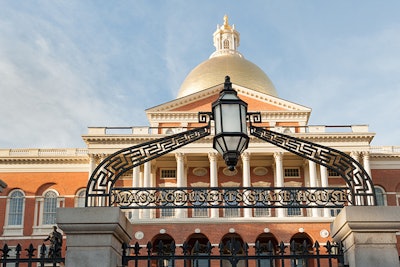
With changes made to the original ballot initiative, ambitious deadlines and potential challenges related to local zoning regulations, Massachusetts' newly appointed Cannabis Control Commission (CCC) has a bumpy road ahead to begin recreational sales by summer 2018, according to Jesse Alderman, attorney at Massachusetts’ Foley Hoag and co-chair of the firm’s marijuana practice group.
In November 2016, Massachusetts voters approved Question 4 to legalize adult-use cannabis in the state, but legislators immediately voted for changes to the original ballot initiative. After two bills were passed by the state House and Senate in June (one that would have overhauled the original ballot initiative, and another that would have kept much of the original referendum intact), state legislators agreed upon and passed a compromise bill in July that more closely reflects the original ballot initiative. But that pushed back recreational sales six months to summer 2018.
“I think the pace has been very deliberate in Massachusetts,” Alderman said in an interview with Cannabis Business Times. “I think Massachusetts has been very attentive to doing this right rather than doing this quickly. Time will only tell what approach is best, but Massachusetts, I think, will distinguish itself as one of the slower states.”
Alderman said the original referendum and the compromise bill both called for the establishment of the CCC tasked with regulating and enforcing the industry.
Final appointments were made to the CCC last week, which will begin accepting licensing applications on April 1, 2018, with licenses issued starting June 1. This, however, does not allow much time for the commission to put regulations in place, or for businesses to become operational.
“The CCC has to promulgate regulations to implement a licensing program by March 15, 2018, accept license applications starting April 1, 2018, and may issue the first licenses if it chooses no sooner than June 1, 2018,” said Alderman. “Given that the agency is independent from any constitutional office, it’s unclear how it would be held accountable if it missed these deadlines.”
There is no cap on the total number of licenses issued in the state under the new legislation, however, Alderman said, “A big change [in the compromise bill] is the referendum had no limit on the number of licenses that an applicant or entity could hold. That is not the case anymore.”
According to the new bill, a licensee can only hold three of each type of adult-use license, which include retailer, medical marijuana treatment center, product manufacturer and cultivator, Alderman said.
In addition, while the referendum provided a “head start” for medical marijuana businesses, the compromise bill only allows for “priority review,” where adult-use license applications from entities with current medical licenses will be approved or denied before any other applications are reviewed. Initial review of priority applicants begins April 15.
Taxes and Zoning Laws
The bill also raised the tax rate on adult-use marijuana from 12 percent, outlined in the original ballot initiative, to 20 percent.
In addition, Host Community Agreements are now required under the new legislation, meaning that adult-use businesses must pay to their local municipality an “impact fee” of no greater than 3 percent of gross revenue for no more than the first five years of operation.
Another significant change, Alderman said, relates to how municipalities can control whether cannabis businesses are allowed within their boundaries. The new legislation allows local governments in towns that voted “no” on the 2016 ballot initiative to ban marijuana businesses until December 2019, while towns that voted “yes” in 2016 must vote on proposed bans on a local ballot initiative.
For cultivators and other businesses hoping to enter the state’s evolving cannabis market, Alderman says it is important to pay close attention to zoning laws.
“My first piece of advice that I give to anybody looking to enter the Massachusetts market is pick a site, then pick three more, then pick five more because the local zoning has been incredibly arduous, and it’s just been difficult to get through that,” he said. “I hope with some of the restraints on local controls that are in the new legislation and the normalization of a cannabis market in Massachusetts that we’re starting to see, … going forward there may be some relaxation of local resistance, but I believe by far the biggest hurdle is going to be local licensing.”
Alderman also said that while he does not believe the state licensing process is going to be exceptionally difficult, applicants should be prepared to undergo background checks and questioning about their investors “as part of that process,” he said.
Because the state is not putting a cap on the total number of cultivation licenses or other license types issued, the licensing process should not be competitive, Alderman said, but he does have some doubts about whether the state will be prepared to accept applications by the set deadline.
“I think getting it up and running in time for an April 1, 2018 deadline to accept applications is incredibly ambitious, and that’s something that people should be mindful of,” he said. “We may be forced to see some delays.”
Selecting Regulators
State Senator Jen Flanagan was the first CCC appointee to the board, and had been the only one until late last week, according to a Sentinel & Enterprise report.
The law calls for five commissioners: one appointed by the treasurer with a corporate management and finance background, one appointed by the governor with a public health background, one appointed by the attorney general with a public safety background and two appointed by consensus—one with a legal, policy or social justice background and one with experience in regulated industries.
RELATED: Mass. Approves $300K for Cannabis Control Commission Budget
Last week, business executive Steve Hoffman, attorney Britte McBride, deputy general Kay Doyle and THC Staffing Group co-founder Shaleen Title joined Flanagan as appointees to the commission, per Sentinel & Enterprise. Flanagan is Gov. Charlie Baker’s appointee.
“I think the governor has taken a cautious approach to the cannabis issue, but has not interfered or actively disrupted the market in any way, and I would expect that to continue,” Alderman said of Baker. “His appointee to the Cannabis Control Commission, Senator Flanagan, was an opponent of Question 4, but she is also a very sensible person and one I expect more people in the industry can live with.”
Alderman said that Gov. Baker’s appointments to the Cannabis Advisory Board, a lesser regulating body in the state, reflected the same goal of including a variety of viewpoints, including those opposed to cannabis reform, but Alderman does not believe Baker has any intention of disrupting the rollout.
Alderman foresees many challenges ahead for the CCC, but is hopeful that the committee will meet the program’s deadlines. He predicts that some of the established medical operators will be licensed for adult-use sales shortly after the first licenses are issued on June 1, 2018, but thinks it will take time before a fully mature recreational market will be operational in Massachusetts.
“I think it’s going to be a big challenge for this Cannabis Control Commission, with all the oversight and enforcement responsibilities that are about to be put on its plate, to get up and running for an April 1, 2018 licensing application [start] … but it’s what the current timeline is, so hopefully they’ll come as close as possible to sticking to it,” he said.
Top image: © Natalia Bratslavsky | Dreamstime.com
























